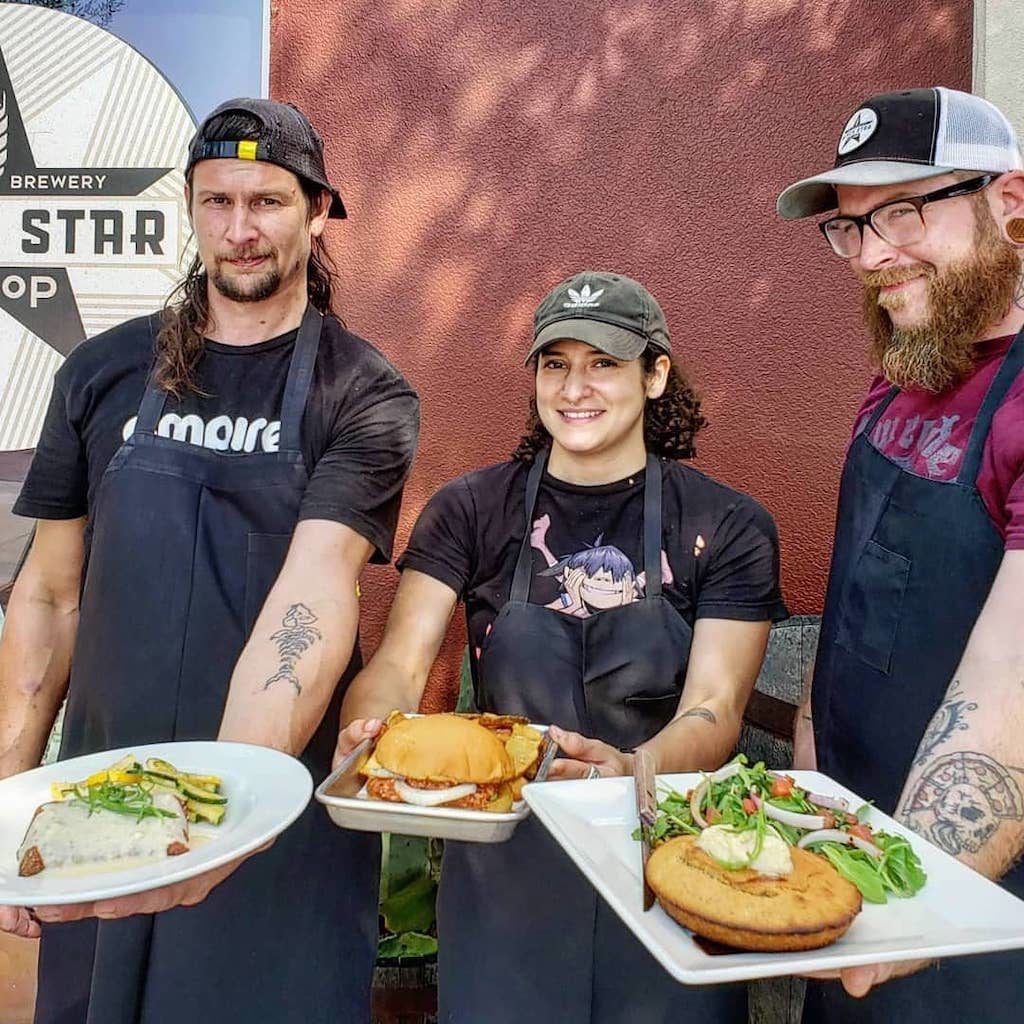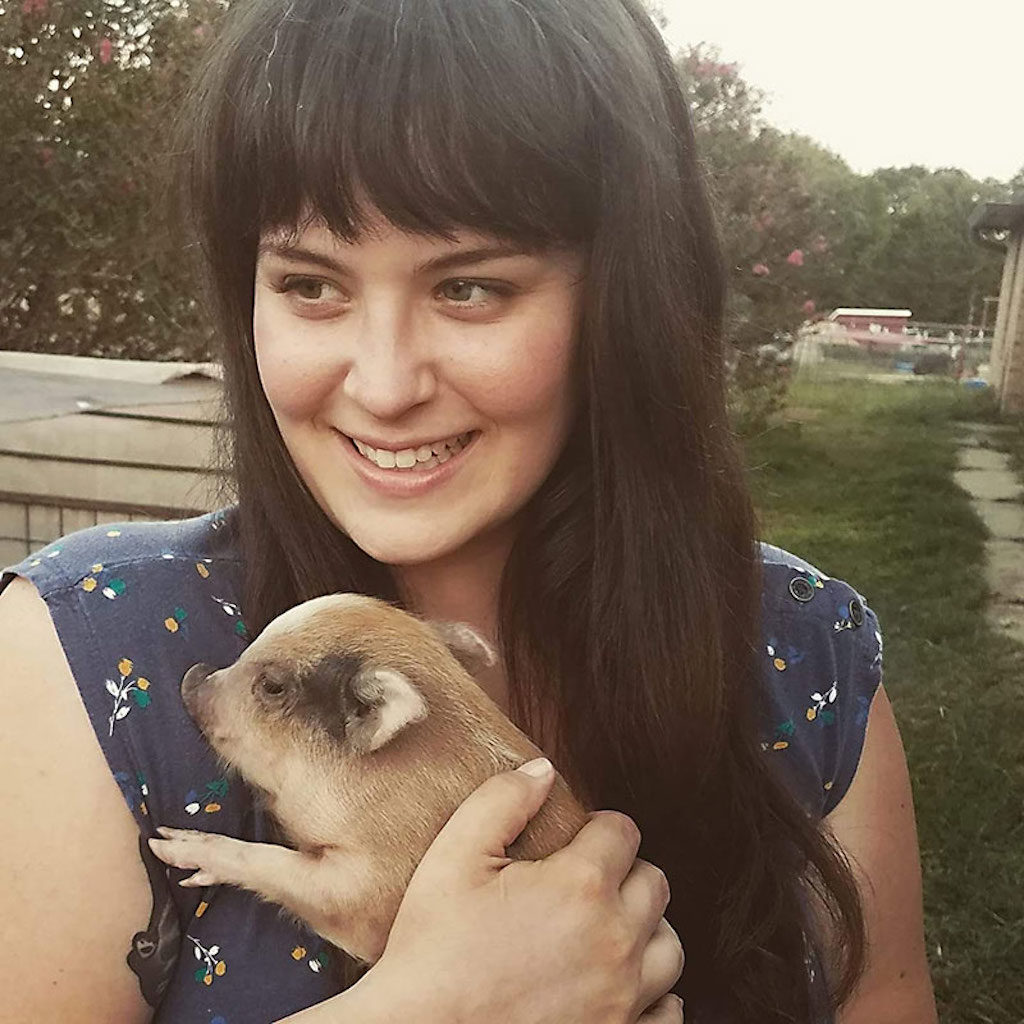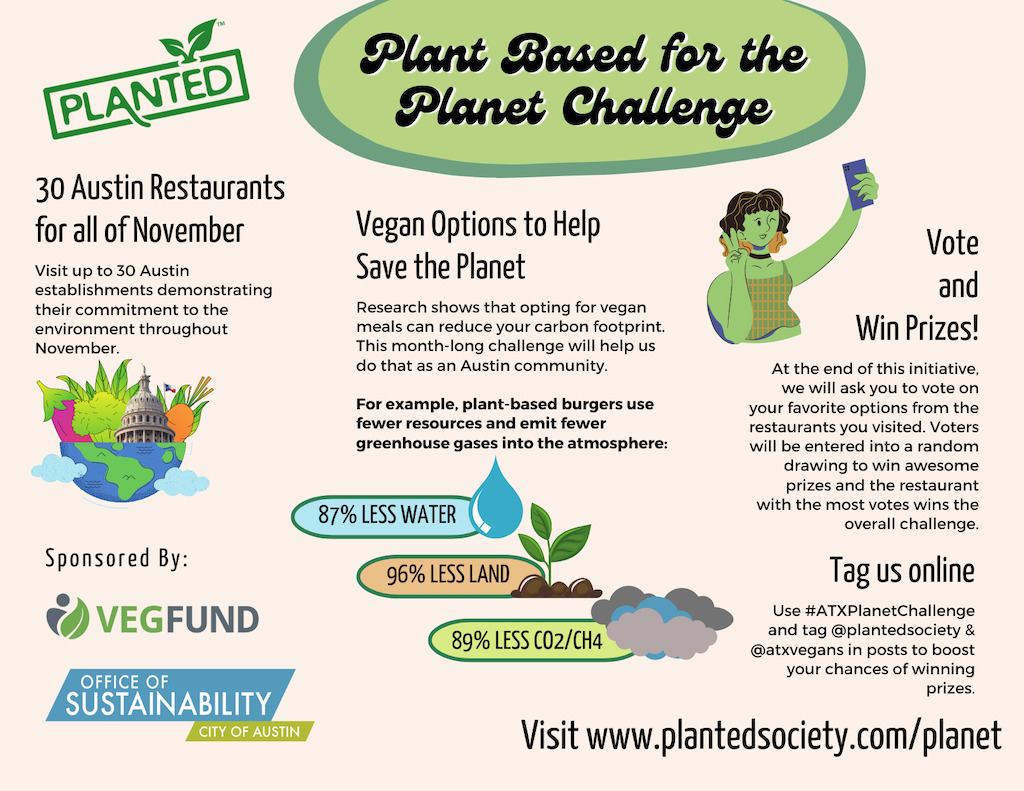10 Mins Read
This November, the City of Austin’s Office of Sustainability is launching a month-long plant-based restaurant campaign and it’s all thanks to Britty Mann. Green Queen‘s Sonalie Figueiras talks to the Austin, Texas-based food educator and community activist about her mission to empower local chefs and restaurants to decarbonize their menus.
Britty Mann was tired of the lack of vegan options in her home city so she created a platform for change. Just a few short years later, Planted Society has helped add hundreds of plant-based dishes items on restaurant menus, inspired restaurants to become fully vegan, and is about to debut a sponsored partnership with the City of Austin during the month of November dubbed ‘Plant Based for the Planet Challenge’, which will see local restaurants promote a variety of activations from free coffees with plant-based meals to eliminating plant-based milk surcharges and chefs creating special daily meat-free dishes.
Below, I talk to Britty about how her mission has evolved, what has surprised her most about her journey, whether restaurant menus are inclusive enough, and whether the future is vegan.

What was the mission of Planted Society when you started versus what the mission is now?
Britty Mann: I was running my local nonprofit ATX Vegans back in 2016 when I started a project pressuring non-vegan restaurants to serve more vegan food in my home of Austin, Texas. We were genuinely just interested in branching out from our regular spaces since the crowds at our events were getting bigger and it felt risky to invite folks out knowing we might fill the space before everyone could arrive. As much as I like to support fully vegan restaurants, omnivore restaurants around town had bigger seating areas and outdoor spaces, though many lacked good vegan options. I figured a “Vegan Night” was the least they could do if we were guaranteeing that 60-70 people would come out to dine, and we continued calling them “Vegan Nights” before I branched it out to become Planted Society.
Back then, our only mission was to make Austin restaurants a little more vegan-friendly, but I quickly recognized that I could utilize our existing work to help local businesses navigate customer demand for more plant-based options. It can be scary for restaurants to implement even the simplest menu change since common mistakes can lead to high costs and low returns for businesses already working with razor-thin margins.
Since inception, we’ve been able to help add just under 300 plant-based menu items at restaurants in Austin, Houston, Boston, and Chicago, including permanently converting 5 restaurants to 100% plant-based. Since we have outgrown our original home base, we decided this year to officially register Planted Society as a nonprofit and are preparing for a big year ahead, including seeking funding and grants to support our current work and grow our programming. Our projects currently include a partnership with the AVA Summit and the Plant Based for the Planet initiative, which is our largest to date. We have plans for initiatives with local school districts, hospitals, grocery chains, and more that we cannot wait to announce in the coming weeks and months.
What has surprised you most about your journey with Planted?
Britty Mann: What never fails to surprise me is the willingness and enthusiasm I receive from chefs, managers, and owners about the possibility of going completely vegan for a night or adding menu options. I begin every new relationship assuming I’m going to spend a lot of my time convincing, arguing, and pleading for folks to work with our programming – but with nearly every partnership, I’m met with the same sentiment: Managers and owners saying ‘I have been thinking that this might be a good idea and I just haven’t had the time to really sit down and think about how to do it. Or chefs saying ‘I love coming up with new things and this gives me a fun challenge.’
Like many veteran vegans, I can’t help but pinch myself when I see businesses that want to cater to our needs or have perhaps already been trying to do so. Sometimes it just helps to have someone like Planted Society come in and make sure it gets done the right way.

Do you believe there is a future where everyone is vegan?
Britty Mann: There was a time when I was certain a vegan future was possible as long as we never stopped fighting for it, even if I wasn’t lucky enough to be around by then. Though I’m still hopeful for that future, the goalpost for me is a lot simpler: I just want to make sure that veganism is as easy as possible for everyone who wants it. And the more work I do in this space, the more I see how necessary it is for activists, entrepreneurs, and policy-makers to remove barriers to veganism in any way that they can. My mission now is really just to make it as appealing as possible for everyone to make choices that benefit the planet and everyone on it. I think I’d be happy enough with that future.

Why is it so hard for restaurants to add vegan menu items? What type of feedback/pushback do you get most often?
Britty Mann: The truth is that it’s usually not very hard for restaurants to add vegan menu items, it’s really just scary for businesses to take risks.
Entrepreneurs and chefs express the same fears that we hear from friends and family: it’s too expensive, I don’t have time, it’s not going to stick, I’ll lose the respect of people I like and if it’s not ‘broke, why fix it? For businesses, this translates to fears about heightened food and labor costs paired with the prospect of losing existing customers and not gaining enough new customers to make up for those expected walk-outs.
Chefs and owners are even more risk-averse after surviving a pandemic where restaurants were hit particularly hard, and considering that the industry as a whole is experiencing very real staffing difficulties post-quarantine, it’s no surprise that many are seeking a distraction-free path back to safety.
Luckily, as soon as we come in, most of those arguments are out the window. It’s our job to show them that working with Planted Society is not a charitable favor (though we are a charity!) or a distraction, but can actually be part of a supply-chain-centered business strategy that can help lower their food costs, empower their kitchen staff, attract new customers and gain the respect of the community.
What has been the reaction of consumers at the participating F&B outlets? Has this driven sales? Or have the menu items attracted flexitarians who would have otherwise eaten animal foods?
Britty Mann: Though we like to say our target audience is anyone who likes plant-based food, the overwhelming majority of RSVP’s may come from members of the vegan community, though self-described omnivores and flexitarians are eating these dishes just as much if not more often than vegans. As we tell our restaurant partners, vegans are often the ones who get to choose where the group eats.
Pre-pandemic, our activations ended in massive sales gains for our restaurant partners: anywhere from 35% sales increases to triple what they would normally see in a given period. Post-pandemic, we’re still trying to find an average expectation to share with partners that doesn’t artificially inflate the value of our program in these times. We can definitely still boast that partners should expect at least a 10-15% increase in sales during our activations, and we see that the longer we stay out of quarantine, the more that number is rising.
Food is political in many ways. Do you see veganism as a political movement?
Britty Mann: Though food is inherently political, I don’t see veganism itself as a political movement. I think advocates can allow themselves to think bigger by acknowledging that veganism is simply one of many disinvestment strategies that can work within several existing political movements. Animal rights, civil rights, environmental justice, healthcare…the list goes on… are all inextricably linked to consumption, and I think veganism is a great example of an individual boycott that can help support positive outcomes that aid the goals of larger movements.
Do you see an overlap between the DEI movement/larger social justice movements and getting more vegan dishes on restaurant menus?
Britty Mann: I am a firm believer that there is not one single strategy that will, in itself, solve the social and environmental crises that are caused by animal consumption, but I do believe we can help move money away from harmful industries by making vegan food available and affordable on as many menus as possible.
Since Black, Brown, Indigenous, and low-income communities are disproportionately and inequitably affected by animal agriculture, I believe that the fight for animal rights and environmental justice is inextricably connected to any anti-racist movement. We have a long way to go in making that connection a more purposeful, inclusive, and equitable one.
Planted Society is, first and foremost, an organization that utilizes the inherent power of local public demand, so I think that our programs can be a meaningful resource to individuals and existing BIPGM-led grassroots organizations in the fight for food sovereignty, including efforts to eradicate food apartheids and food swamps. As we grow, my hope is that we are able to reach as many communities as possible, and that we can do our small part to make the overlap between animal advocacy and other social justice movements a more inclusive and intentional one.

Tell us more about your partnership with the City of Austin. How did that happen? What are your goals with this? Do you see this as a potential framework/template for other cities?
Britty Mann: This November, we are partnering with over 30 businesses in Austin to incentivize individuals to choose plant-based options when dining out. Each small-business partner is making a meaningful contribution to the challenge: Some are adding vegan dishes to their menu for the month, some are offering sizable discounts when customers choose a plant-based entree, and some are even giving away free food and beverages. At the end of the challenge, we’ll survey the community to determine the best dishes and give away some great prizes to individuals as well.
Our campaign is focused not only on sending the existing plant-based community into new spaces, but reaching everyone who dines out in Austin with the message that we don’t have to sacrifice quality and taste to make small choices that positively impact the planet. Because so many Austinites are already making efforts in their own lives to lessen their carbon footprint, we estimate that a large number of restaurant patrons will be enthusiastic about participating.
Because this is a city-wide, environmentally-focused campaign, the City of Austin’s Office of Sustainability was interested in sponsoring it since it aligned with the goals of Austin’s Climate Equity Plan. When they agreed to come on board, I was both thrilled and intimidated, and I have to say that it certainly has helped motivate me to make this the best program possible. We want to be able to use this as a blueprint so we can partner with existing organizations in cities around the country, and I’m happy to say those conversations have already started.
Do you think local governments should be actively working to decarbonize their citizens’ plates?
Britty Mann: Though many cities are making some effort to acknowledge the growing climate crisis, actually demonstrating a commitment to climate initiatives is easier said than done. I’m lucky to live in a region of Texas where a Climate Plan even exists, let alone one that addresses equity issues. And out of those who are pushing climate initiatives, so few of them are emphasizing anything other than transportation and landfill-related emissions solutions.
I think that while it’s incredibly important and impactful when local governments sponsor, enact or legislate in the direction of a more sustainable local food system, any initiative is really at the mercy of what the public is willing to fight for. The best way to create local change is to support the efforts of existing grassroots organizations working with city governments, and if those don’t exist, sometimes you can even start one yourself!
Lead image courtesy of Planted Society.





